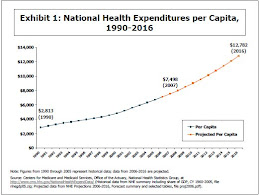Tuesday, January 27, 2009
It's All About the Money
I definitely believe that there are many factors that contribute to the increase in national health spending per capita. I mean there are a lot of people without insurance that use the emergency room for primary care. By this time, the patient has probably let the problem get bad enough to even obtain medical attention and at this time it probably cost a ridiculously amount of money. We also need to consider the cost of insurance. The cost of insurance is progressively increasing each year. Not only is the premium expensive, but the co-pay is also increasing. These problems really hit families with low SES. Going on with insurance, HMOs are very inefficient. For example, I needed to see an allergist. So I had to go to my primary care provider, pay a $30 co-pay, the doctor put in a request for a referral, I then had to come back to my primary care provider to provide a blood sample (costing another $30 co-pay), and then 2 weeks later finally got approved to see an allergist (which is another $30 co-pay). Summary: 2 weeks later, 2 primary care providers, and $90àjust for a referral. GAAHHHH! This was a very very inefficient process. New developments in technology also contribute to the increase cost of per capita health spending. As more research, time, and money are spent to develop new medical procedures, the costs of these procedures are extremely expensive.
In the current recession, less people will be uninsured. Less people will be going to get treatment meaning more people being untreated and letting their illness worsen. The government needs to put more emphasis on healthcare. If the state and national government sets healthcare as a priority and increase the budget, then more people will be able to seek medical assistance.
Necessary Commodity vs. Necessary Evil
We Are a Sad Sad Society --> Nation
Let me rephrase that… health care is catering to the rich, so whatever the rich can afford will be the competing price amongst those providers. Wafa’s cartoon is so amusing, so funny, and, unfortunately, so true. This country is about providing for the rich because it is given that they can afford it. Technology can be a contributing factor in this rise, but I don’t think it may be a determining factor. This spending will have a large impact on poor communities (duh!) as prices will rise and they will continue to be unable to access quality health care. “There’s no need in getting their hopes up.” Consequently, this sad situation is in a much needed health care reform system. Lets consider universal health care and re-evaluate our communities and meeting the quality of life for all and not just the rich.
Living Beyond Our Means
All About Whose Money?
"They Couldn't Afford it Even if it Works."
 Perhaps we're spending too much on technology to treat growing medical problems and not enough on technology to research and prevent the problems from growing.
Perhaps we're spending too much on technology to treat growing medical problems and not enough on technology to research and prevent the problems from growing.I'm no expert on economic issues but it's my humble opinion that if we spent more in the research field we'd potentially spend less in the treatment field. It's not that we don't need technology or it isn't a major benefit in the treatment realm. On the contrary, I feel as though it is vital. However, it's just as important, if not more, to figure out how to prevent people from getting sick in the first place.
At risk of being sounding idealistic regarding a system that we know is faulty and far from being patient-centric, I believe the most important issue here is how that increase is going to impact those who are already struggling to afford health care. What good is an increase in spending when it's not benefiting the people who might need it most?
I'm not sure there's a real answer to that question because the situation is so complex. A poorly executed system in any field drains unnecessary resources. Technological advances cost a lot of money but few people argue the spending when there may be some tiny remote chance the technology could treat cancer or detect genetic disorders. It's a field that allows for a lot of justification for spending but when the affects of that trickle down to the pocketbooks of everyday Americans what do you say? I think that's an age-old question whenever it comes to spending, anywhere.
I believe its time that we start to utilize our resources to their fullest and start focusing on how to make it so that people need these expensive treatment technologies less. It's such a loaded issue and so multi-facited that to think there there are even only twenty factors that play a large role is, I think, naive. There are so many people, organizations, businesses, so much politics and the like involved that before we can even get people to care about how we can make everything more cost efficient we need to come up with a better understanding of why it is and why we should.
